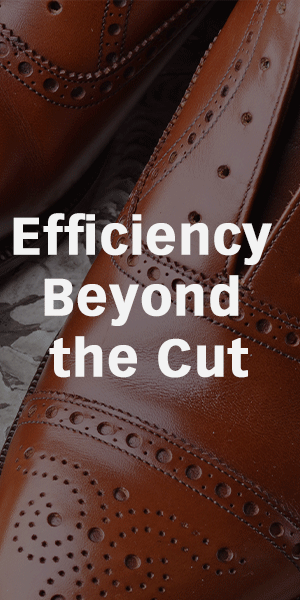Boots for the working woman

Safety footwear entrepreneur Emily Soloby is adding her voice to the call for employers to make sure shoes and boots for women fit properly.
In 2023, the US government’s Occupational Safety and Health Administration (OSHA) regulatory agency launched a new proposal. It wants to revise the current standard for personal protective equipment (PPE) to make it a requirement that products, including safety footwear, in use in the construction industry in the US “must fit properly”.
Improperly fitting PPE may discourage employees from using the equipment in the workplace, might fail to provide adequate protection and even present additional hazards, OSHA says.
Existing rules mean employers have to make sure construction workers have suitable PPE. Even if employees comes onto a construction site with their own equipment, it is the employer’s responsibility to make sure that what their workers wear is suitable and in reliable condition. There are rules specifying that clothes, footwear and other PPE must fit properly in maritime work environments and in general industry, but this is not part of the regulation for the construction industry at the moment. It is for this reason that OSHA is requesting a revision of the standard.
Because it concerns footwear and affects women, this call for change quickly came to the attention of Emily Soloby, founder and chief executive of Juno Jones, the “by women for women” safety footwear company she launched in her home city, Philadelphia, in 2020. Such is her love of boots, Ms Soloby has devoted time to learning the craft of shoemaking during spells with artisans in Mexico and New York. However, before launching her own footwear company, she first worked as a legal aid lawyer representing women and children in court pro bono. Then, with her husband, Ryan, who is now the chief finance officer of Juno Jones, she ran a small truck and heavy equipment safety training firm for ten years.
A gap to fill
This work made her aware of how difficult it has been, typically, for women to be able to find safety footwear that functions well, looks good and fits properly. She decided to try to fill the gap and came up with her plan for Juno Jones. Her earlier experience in Mexico helped her build a strong relationship with a manufacturing partner in León, Guanajuato.
The company’s first product was the Meti safety boot. Steel-toed and stylish, the boot is ASTM F-2413-18 certified for impact and compression. It is also electrical hazard certified, has a puncture-resistant midsole, non-slip lug tread, oil and gas resistant outsole, waterproofed leather upper (with the leather sourced from tanneries with a gold rating from the Leather Working Group) and water-resistant construction. Inside, the Meti has a removable memory foam insole with antimicrobial, anti-fatigue and arch support properties.
A recent version in a new colour called Cherry Bomb, to go with the Espresso, Medusa and Raven Black, has proved popular. This has been followed by the Serpentine, which has a longer shaft, eight inches compared to six inches for the Meti.
All Juno Jones boots are made on lasts that Emily Soloby describes as being anthropometrically correct for women’s feet. This is a subject close to her heart as well as to her feet and it is for this reason she has added her voice to the OSHA campaign for change. “Studies show that women’s feet are anthropometrically different from men’s feet,” she tells World Footwear. “The ‘pink it and shrink it’ method of using smaller male lasts to create women’s shoes is no longer acceptable.”
Positive reaction
She explains that it is not yet clear when the proposed change will come into effect but she is delighted by the “positive buzz” the 2023 announcement has created. A comment she made on this subject on LinkedIn, showing a simple graphic and the wording ‘PPE must fit: one size does not fit all’ generated 20,000 impressions. Previously, her most popular posts on the business social networking site were generating around 4,000. She says this was a reflection of an increase in discussion around this topic in the construction community following the OSHA announcement.
Last September, her efforts to bring about change, through Juno Jones, received even greater recognition when non-profit safety organisation the National Safety Council presented the brand with a ‘best in show’ award at the 2023 Safety Congress and Expo in New Orleans. “The fact that a small, woman-owned company, making safety boots for women’s feet, was able to take home one of the top prizes shows that public opinion backs women’s PPE, and that inclusion in the workplace is gaining momentum,” Ms Soloby says.
The OSHA announcement makes it clear that adding a ‘fits properly’ provision to its PPE standard for general industry happened precisely because “standard-sized PPE does not fit all employees, particularly women”. Specific to construction, it says that, because women make up a relatively small percentage of the construction workforce, many manufacturers of protective equipment have been “reluctant to invest in research and development to produce correctly sized and proportioned products for women”. Luckily for the women who do work in construction, Juno Jones has turned this reluctance on its head and enthusiastically embraced the challenge.
Niche market
In terms of market size, OSHA estimates that women made up 14% of the workforce in construction in the US in 2022. Its latest figures suggest this means there are just over 1 million women working in the sector. And even though not all employees need to wear protective footwear and clothing, its calculation is that at least 800,000 women do. Of course, there are plenty of other areas of industry in which women employees can also benefit from wearing Juno Jones boots.
“As a company, we are seeing more and more interest in safety footwear designed for women’s feet,” the brand’s founder says, “and our distributor relationships are growing in number. We are seeing distributors as well as employers becoming more proactive about making sure they have the correct PPE to keep their female employees safe.”
She adds that it is important that employees continue to ask for the proper PPE. It is equally important that companies’ human resources departments and safety departments take steps to set up good vendor relationships with brands making women’s PPE. She thinks small, specialist manufacturers of women’s safety footwear should be part of this and can play an important role in improving things.
Juno Jones founder and chief executive, Emily Soloby.
All credits: Juno Jones












